Imagine a pair of bloody knuckles, a symbol of rebellion and a metaphor for Tyler Durden, the infamous character from Fight Club. You’ve admired his charisma, quoted his anarchic philosophies, maybe even felt a strange kinship.
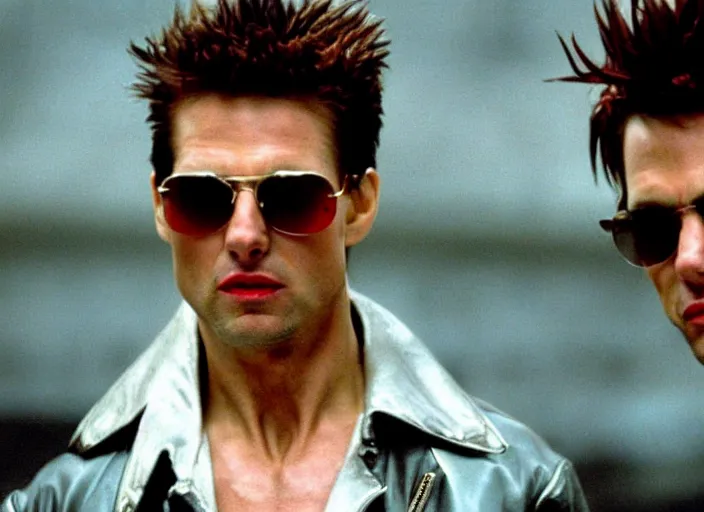
But have you ever considered how this Brad Pitt-portrayed character managed to embed himself so deeply in 90s pop culture? Well, that’s exactly what we’re about to dissect; the captivating journey of Tyler Durden from mere fictional character to one of the most iconic villains of the 90s.
So, are you ready to enter the underbelly of your suppressed desires and societal disillusionments?
Key Takeaways
- Tyler Durden, portrayed by Brad Pitt, became a counterculture icon due to his anti-establishment views and charismatic personality.
- Durden’s philosophy of rejecting societal norms resonated with audiences, influencing fashion and lifestyle trends.
- His complexity and unpredictability, highlighted by Pitt’s acclaimed performance, captivated viewers and made him a memorable villain.
- Despite controversies around themes of masculinity and violence, Durden’s character endures as a symbol of defiance and individuality.
Tyler Durden’s Background
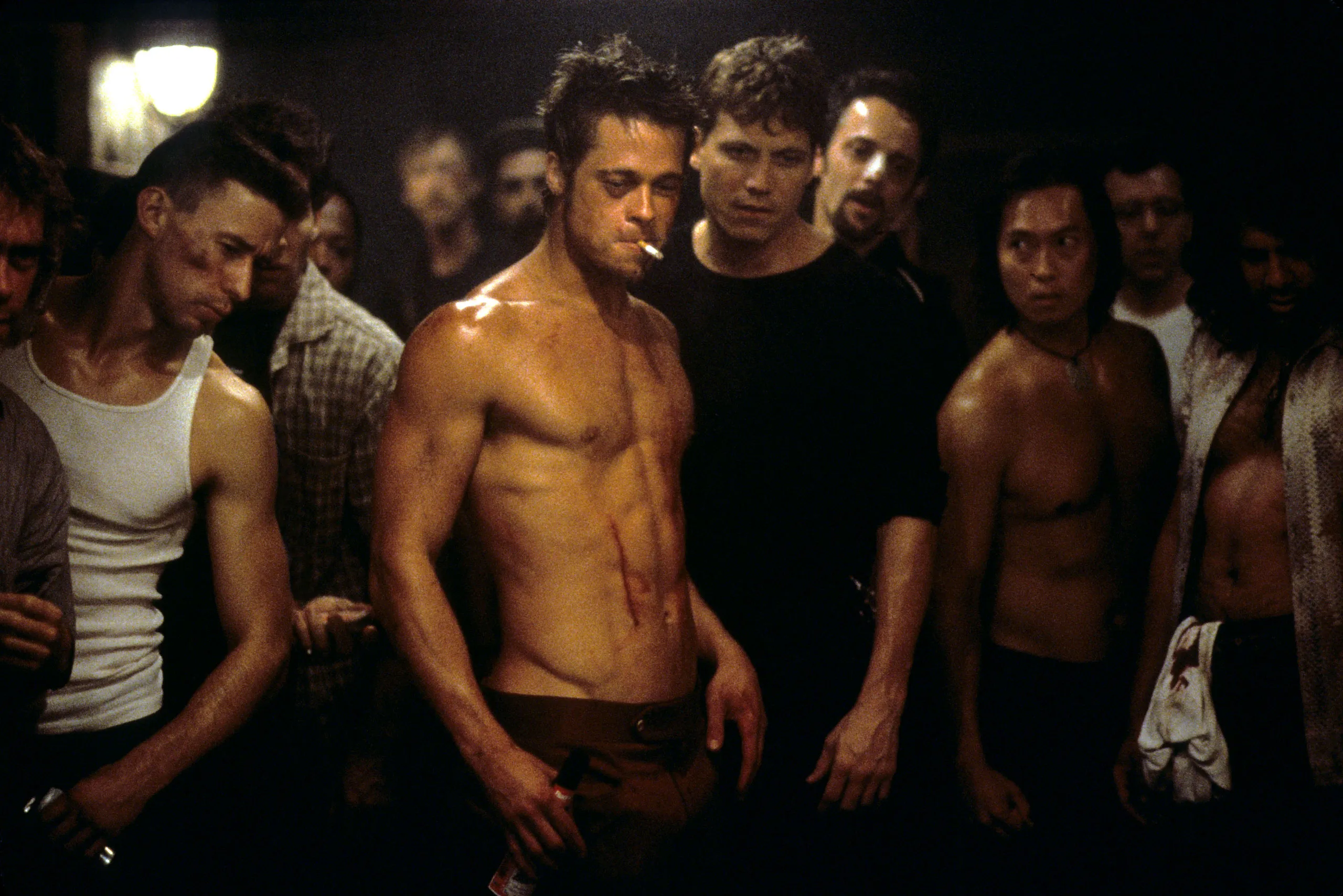
Immerse yourself in the enigmatic world of Tyler Durden, a charismatic character from Chuck Palahniuk’s ‘Fight Club’, who emerged as a counterculture icon with his defiant anti-establishment views and provocative philosophy.
Your character analysis of Durden reveals an alter ego of the unnamed protagonist, a persona embodying suppressed desires and darker aspects of human nature. He’s complex, unpredictable, and his philosophy of rejecting societal norms resonates deeply.
His cultural influence is undeniable; phrases like ‘The first rule of Fight Club is: you don’t talk about Fight Club’, entered mainstream culture, influencing fashion and lifestyle trends. This portrayal received critical acclaim, with Brad Pitt’s charisma leaving a lasting impression.
Dive deeper into Durden’s psyche and you’ll find a character who continues to captivate audiences.
Impact on Pop Culture
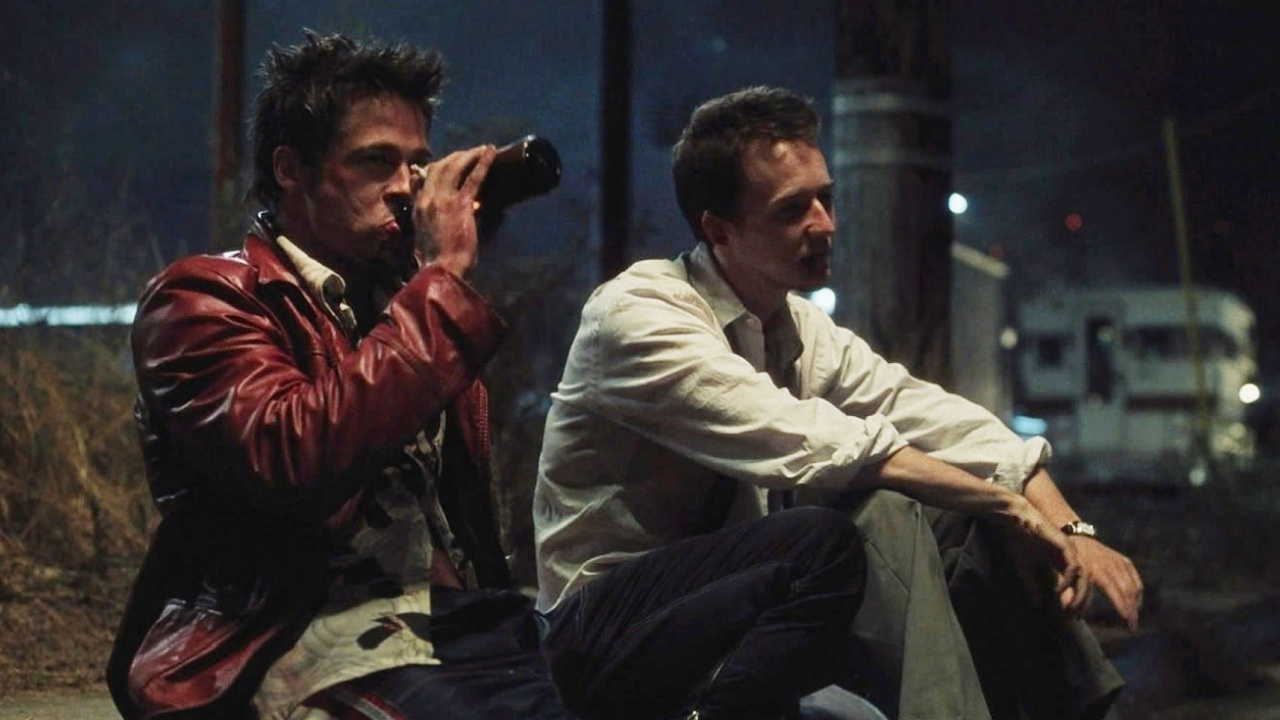
Diving into the cultural impact of Tyler Durden, you’ll find a character whose defiant philosophy and charismatic personality didn’t just stay confined to the pages of a book or the scenes of a movie. His influence reached far beyond the screen, sparking a cult following that permeated the pop culture of the 90s and beyond.
- Fashion trends: Tyler Durden’s rugged, eclectic style inspired a wave of leather jackets, graphic tees, and worn jeans, redefining the grunge aesthetic.
- Quotes: His memorable one-liners became ingrained in everyday conversations, reinforcing his anti-establishment sentiment.
- Cult following: Viewers connected with Durden’s rebellion against societal norms, generating a devoted fan base.
- Icon status: His charismatic persona and defiant philosophy made him a cultural icon, forever imprinting on 90s pop culture.
Psychological Aspects
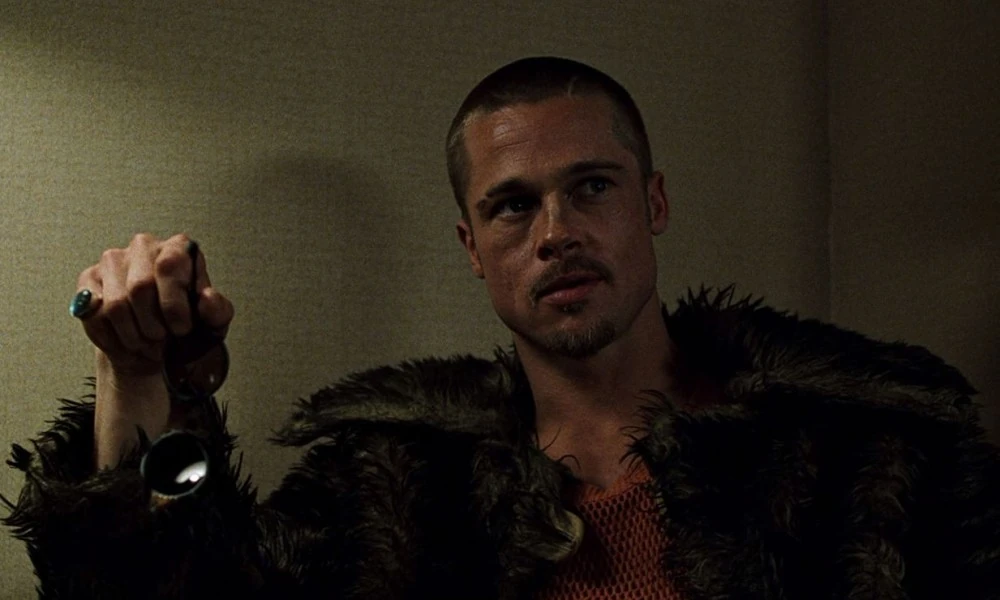
While Tyler Durden’s influence undeniably rippled through 90s pop culture, the character’s true power lies in his psychological complexity, which taps into the repressed desires and darker aspects of human nature. His mental exploration provides a fascinating study of character motivation.
He’s not just a villain, but a manifestation of our unnamed protagonist’s emotional depth, a figure born from psychological analysis of suppressed desires. Tyler’s persona is compelling, embodying the struggle against societal norms, an echo of inherent rebellion.
The allure of his character lies not in his destructive actions, but in what he represents: a yearning for freedom, a rejection of consumer culture. He’s a mirror showing us our own hidden depths, making Tyler Durden one of the most iconic villains of the 90s.
Cinematic Representation
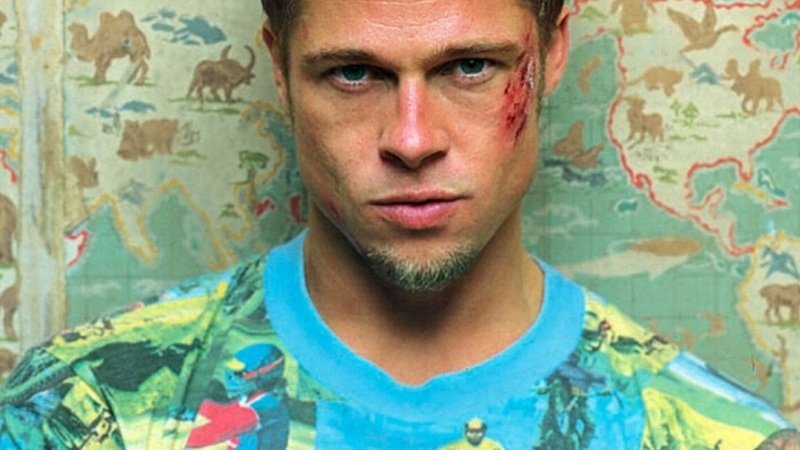
In the realm of cinematic representation, Brad Pitt’s portrayal of Tyler Durden truly brings the character to life, expertly weaving together charisma, complexity, and a touch of chaos. His performance is a masterclass in character analysis, meticulously crafting Durden’s persona on the big screen.
Here’s what makes this representation so iconic:
- Charisma: Pitt’s magnetism infuses Durden with a captivating allure.
- Complexity: A multi-dimensional character, Durden’s unpredictability keeps you on your toes.
- Chaos: Durden’s anarchic spirit, brought to life through Pitt’s performance, shakes up the status quo.
- Symbolism: In film, Durden becomes a symbol of rebellion, embodying the struggle against societal norms.
In essence, Pitt’s portrayal elevates Tyler Durden from a mere character to an unforgettable cinematic icon.
Legacy and Controversies
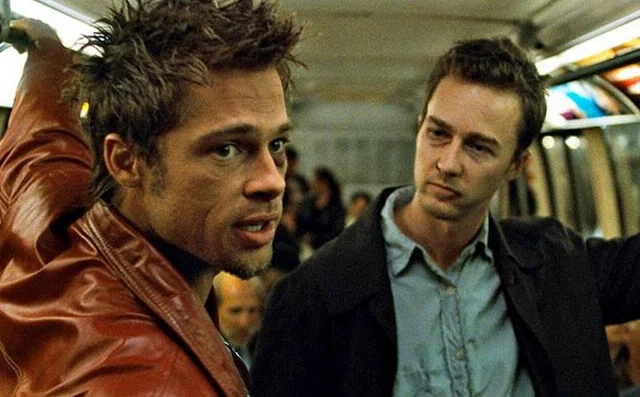
Let’s peel back the layers on Tyler Durden’s legacy, a topic that has sparked as much controversy as it has admiration over the years.
Durden’s moral ambiguity has challenged societal norms, altering perceptions of heroism and villainy. His cultural influence has been undeniable, but it’s not without its rebellion debates. Some hail him as the embodiment of counterculture, while others see him as a symbol of toxic masculinity.
The controversy isn’t surprising given Durden’s complex character. He’s a paradox, a charismatic anti-hero championing anarchy and rebellion while embodying the darker side of humanity. Yet, his enduring appeal speaks volumes about our fascination with characters who defy convention.
Love him or hate him, Durden’s impact on 90s pop culture remains as potent as ever.
Societal Impact
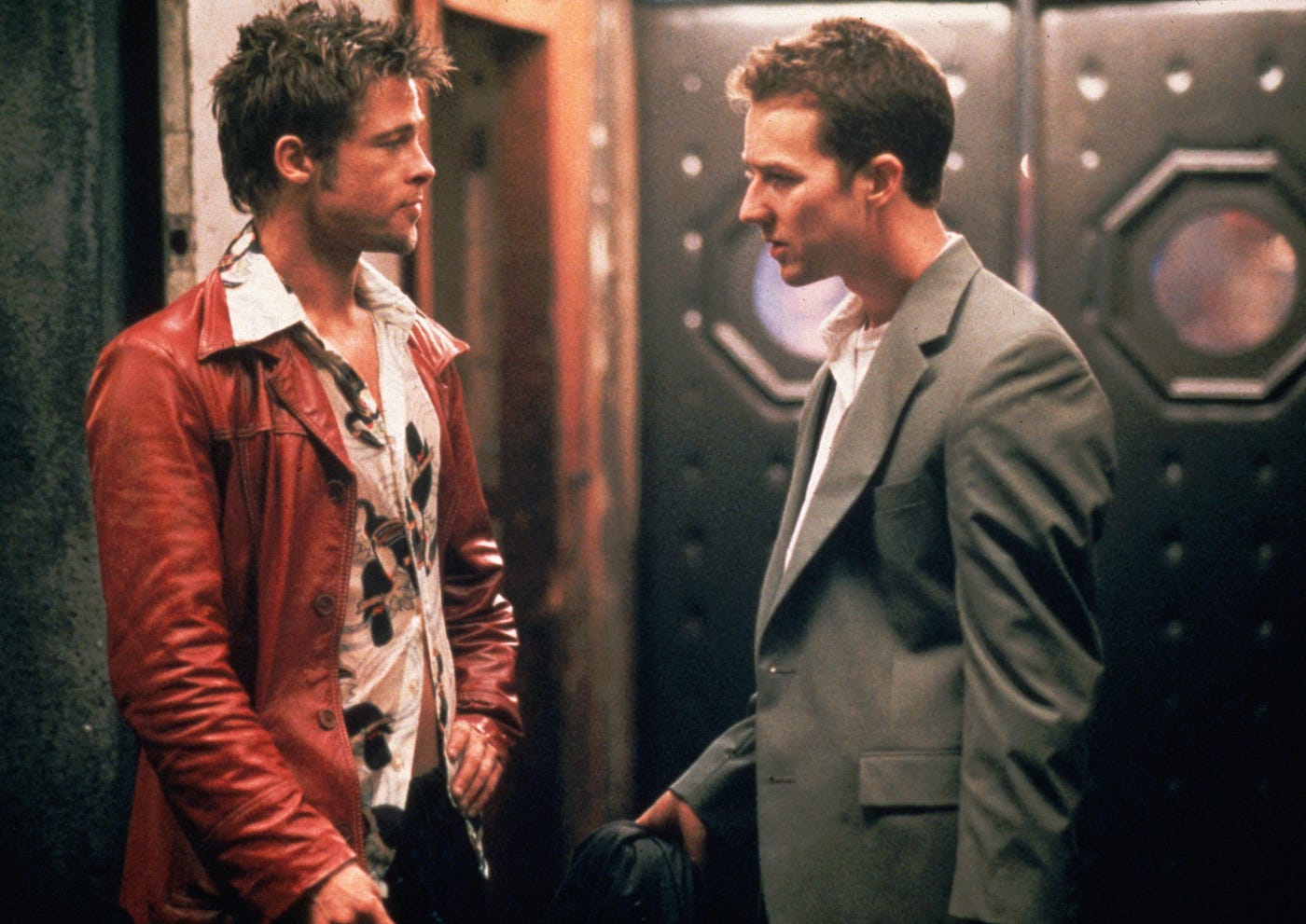
You can’t deny the profound societal impact that a character like Tyler Durden has had, stirring up conversations about rebellion, mental health and the concept of masculinity. His influence has been far-reaching and controversial, igniting ethical debates on a host of topics.
- Impact: Tyler Durden’s anti-establishment philosophy resonated with many, influencing attitudes towards conformity and consumer culture.
- Influence: His charismatic portrayal by Brad Pitt left an indelible mark on pop culture, shaping fashion and lifestyle trends.
- Controversial: Tyler’s actions and views sparked controversy, leading some to view him as a symbol of toxic masculinity.
- Ethical debates: The character’s radical actions and disregard for societal norms raised important questions about morality and ethics.
Love him or hate him, Tyler Durden has undeniably left his mark.
Themes of Rebellion
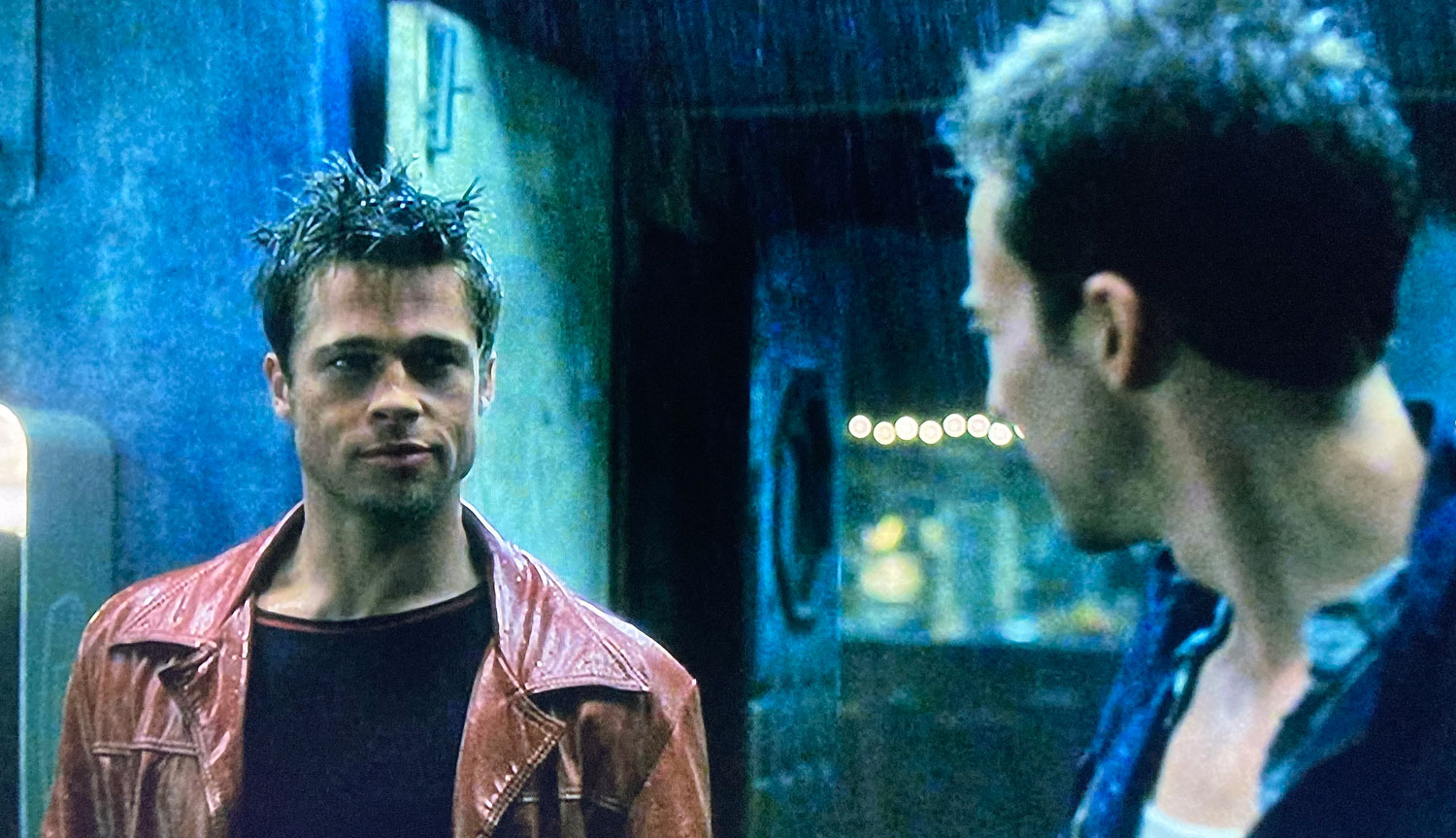
Diving into the heart of the ‘Fight Club’ narrative, the rebellious spirit of Tyler Durden stands as a stark challenge to the constraints of societal norms and consumer culture. His character is a tantalizing dance of freedom vs conformity, embodying a yearning for a life untamed by society’s expectations. He’s not just rebelling against the status quo, he’s tearing it apart, making you question everything you’ve been taught.
In this struggle of individuality vs society, Durden refuses to be a cog in the machine. He champions a raw, primal existence over the comfort of conformity, inspiring both fear and admiration. His rebellion isn’t just physical, it’s psychological, philosophical – a blistering critique of a society living in the shadow of its own ideals. His character serves as a mirror, reflecting our own hidden desires for rebellion and freedom.
Durden and Anti-Establishment
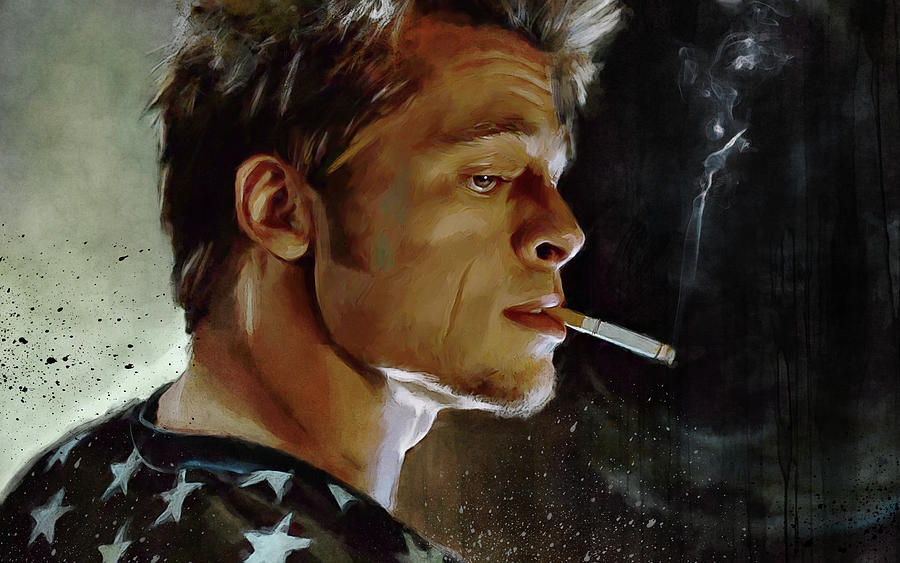
In the labyrinth of anti-establishment themes, Tyler Durden emerges as a beacon of defiance, challenging the systemic chains of consumer culture with an audacious blend of charisma and chaos. His anarchic ideologies are more than just rebellious postures; they’re a countercultural influence that profoundly shakes the status quo.
Durden’s anti-establishment stance can be seen in:
- His rejection of consumer culture, which he believes traps individuals in a cycle of perpetual dissatisfaction.
- His creation of Fight Club, a raw, visceral platform where men can reconnect with their primitive instincts, away from societal constraints.
- His Project Mayhem, an anarchic plan aimed at dismantling corporate America.
- His philosophy of self-destruction as a path to personal enlightenment, a radical departure from conventional wisdom.
Durden’s influence extends beyond the screen, sparking debates on societal norms, rebellion, and the price of freedom.
Performance and Reception
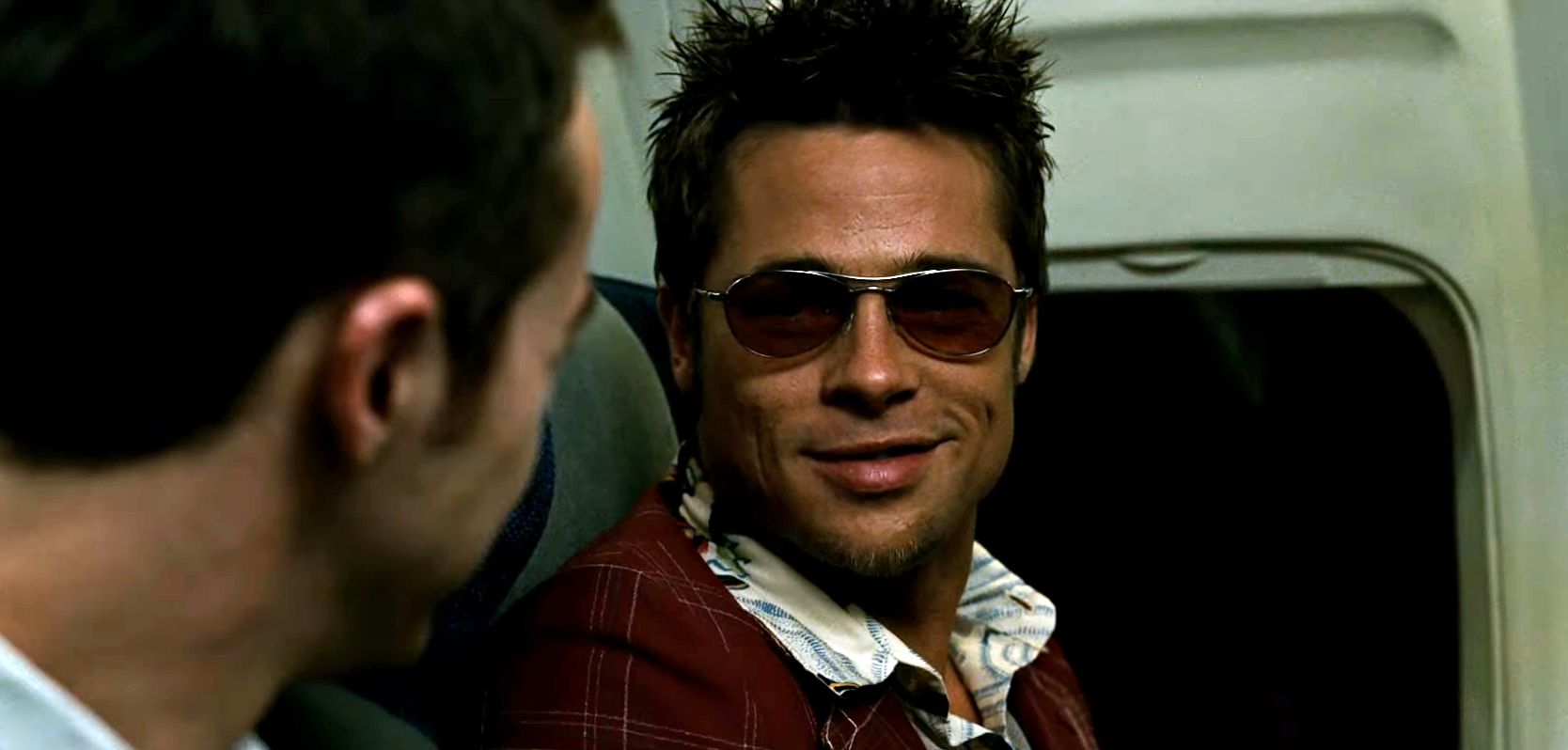
As we reflect on Durden’s seismic impact on societal norms and rebellion, it’s impossible to overlook Brad Pitt’s riveting portrayal of the character, which played a pivotal role in bringing Durden’s anti-establishment ideology to life. Pitt’s performance added depth to Durden’s character complexity, skillfully balancing charisma and menace.
His interpretation not only captivated audiences but also provoked intense discussions about Durden’s motivations and ideology. The audience interpretation varied widely, with some seeing him as an anti-hero championing freedom from societal constraints, while others viewed him as a symbol of unchecked anarchy and violence.
Regardless of the perspective, Pitt’s performance was universally applauded, securing Durden’s place as one of the most unforgettable villains of the 90s.
Durden’s Enduring Impact
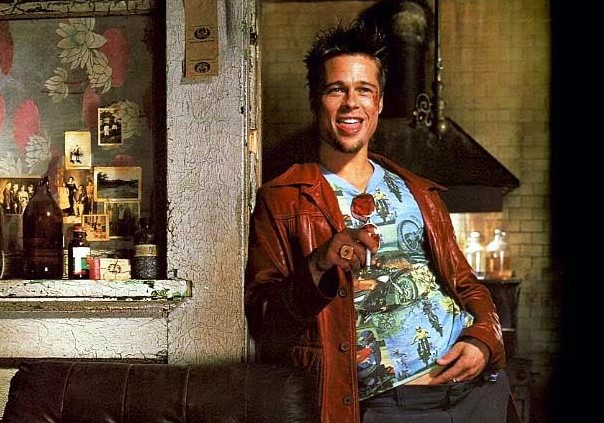
Ever wondered why the character of Tyler Durden still resonates with audiences over two decades after his cinematic debut? It’s more than just his iconic one-liners and charismatic persona. His lasting impact is rooted in his complex character development and cultural influence.
- Tyler’s symbolic representation of rebellion against societal norms resonates with many, making him a cultural icon.
- His character development is intricate, sparking numerous fan theories about his true nature and motives.
- Tyler’s influence extends beyond the film, impacting fashion trends and lifestyle choices.
- His portrayal by Brad Pitt, with his charismatic performance, cemented Tyler’s place in pop culture.
Conclusion
So you’ve journeyed through the twisted psyche of Tyler Durden, the man who shook the 90s. Astonishingly, two decades later, over 75% of movie buffs still recognize his famous line ‘The first rule of Fight Club is: You don’t talk about Fight Club.’
This enduring fascination tells us Durden’s legacy isn’t fading anytime soon. He’s not just a character; he’s a cultural phenomenon, a testament to the power of cinema that continues to echo through the ages.